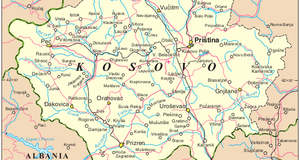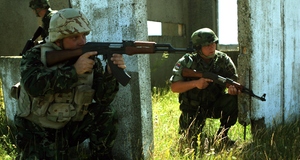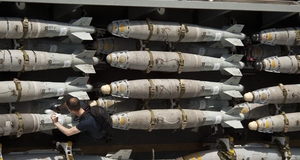Kosovo's Road to Independence
By
2010, Vol. 2 No. 09 | pg. 1/1
KEYWORDS:
Since the collapse of the Soviet Empire in 1991, the world has gone through a final massive wave of democratization in Europe, which was highlighted by the fact that many countries finally gained long sought independence and autonomy. Sudden change of governments resulted in increased tensions, economic meltdowns and violence in some cases, due to the ideological differences of the many groups within the European population. People who had been denied basic human rights and the ability to voice their opinions were finally granted such rights as the states were moving at a full speed towards free and representative democratic systems. In light of this third wave of democratization, the case of Kosovo needs to be mentioned due to the important implications that Kosovo’s independence would have on the international community by becoming a possible precedent for others. Kosovo’s independence was announced 17 years after the collapse of the Soviet Union which created a unique case, because an autonomous republic of the former communist state seceded from the state of Serbia and established itself as the independent republic of Kosovo. The response from the international community was not single sided: some, including the U.S. and the U.K., accepted Kosovo's independence while other states, including China, Russia, and Serbia opposed it, creating a delicate legal dilemma for the newly independent entity. Thus, the impact of Kosovo’s independence on the domestic, regional and international level needs to be examined to understand the future developments around Kosovo, as well as to reflect on what lessons can be learned from the experience, particularly in light of the current status of regions such as Abkhazia, Transnistria, Taiwan, Ontario and many other parts of the world.In order to understand the impact of Kosovo’s independence on the multiple levels of international relations, the historic background of Kosovo’s quest for independence needs to be mentioned, which will help put things into perspective. For many years, the territory that comprises Kosovo has been a disputed territory between Serbia and Albania. The history of Kosovo dates back to 4th century BC, when it was the territory of Thraco-Illyrian tribe, which was subsequently conquered by Rome in 160s BC. Then it was absorbed by Bulgarian Empire in 850s and experienced significant Slavic and Christian migration. One of the key moments in Kosovo’s history was June 28, 1389 Battle of Kosovo, when Serbian forces faced the Ottoman troops, which was a showcase of Serbian resolve, courage, patriotism and it was an instance when Serbs and Albanians fought together on the battlefield. “Later on, in Serbian national conscience the battle of Kosovo has acquired mythical dimension of a crucial historical event, greatly affecting the consequence destiny of the whole Serbian nation” (www.kosovo.net). The Battle of Kosovo later became a pillar in the Kosovo’s nationalist movement for independence in the 19th century, as well as a political tool for the oppressive Milosevic government’s policy towards ethnic minorities within Yugoslavia. The republic of Kosovo formally was created in 1945 by Joseph Tito and in 1974 it was given status of the autonomous republic, which gave it similar rights as the states that existed within the Yugoslavia. After Tito’s death, Albanians living in Kosovo experienced years of brutal and aggressive Milosevic regime, which practiced genocide in Kosovo and claimed that Serbian minority was being ostracized by Albanians. As the former Yugoslavian republics were breaking away from Yugoslavia, Kosovo remained a part of Serbia, which just exacerbated the nationalist calls for the independence. After the 1999 NATO war in Kosovo, United Nations Mission in Kosovo (UNMIK) was created to police the peace in the area and prevent any violence and border clashing between Serbia and Kosovo. However, on February 17th 2008 Kosovo’s parliament declared long sought independence, which resulted in denunciation of independence on the part of Serbia and its biggest ally, Russia. Hundreds of years of Kosovo history is an example of the long quest for independence of the small Albanian enclave within continental Europe, which faces an uncertain future in light of the complete denial of its independence on the part of Serbia, which still regards Kosovo as a part of Serbia. The way that the international community will go about such issue would be a determinant for the future attempts of secession on the part of many territories that are under the rule of one or another state right now. Kosovo’s announcement of independence in 2008 was not the first time that Kosovo attempted to liberate itself from the Serb dominated Yugoslavian republic. Eighteen years earlier Kosovo declared independence which was only recognized by Albania while Serbia still considered Kosovo a part of itself. That failed attempt to declare independence was partially instigated by the reduction in autonomy level by the Milosevic regime, which basically gave Serbian minority in Kosovo an apartheid type of regime. Albanians in Kosovo were treated like second class citizens and had fewer rights than Serbs due to the pressure from its southern neighbor. Albanians in Kosovo had been practicing peaceful resistance to Serbian oppression, however with the emergence of the Kosovo Liberation Army the hostilities were becoming more bloody resulting in deaths from both sides. Kosovo War lasted from 1996-1999 and was ended by the 77-day NATO bombing campaign which resulted in creation of UN peacekeeping force that was supposed to preserve peace, rebuild Kosovo and slowly begin negotiations on the final status of Kosovo. UN Special Envoy Martti Ahtisaari has been one of the leading negotiators in the Kosovo conflict, however much of his efforts were undone by opposition from Serbia and Russia which were against granting any kind of independence to Kosovo. Ahtisaari's plan called for a time table for the Kosovo’s “supervised” independence, “an open market economy with free competition” and a new “Kosovo Security Force (KSF) {that} will be consisting of no more than 2,500 lightly armed active members and 800 reserve members whose main job will be restricted to crisis response and civil protections” (www.thebottomline.lk). Serbia and its ally in the Security Council, Russia, protested the plan which put serious doubts that Kosovo would ever achieve independence on the international level. Local Albanians in Kosovo were calling the parliament to announce the independence itself without waiting for the international actors to agree on the terms of the proposed independence for Kosovo. Thus, the international stage was not set up for the Kosovo’s independence to be properly recognized by the international community, which created an issue of the legitimacy of the February 17th, 2008 announcement and subsequent acceptance of Kosovo as an independent state by the international organizations. Political life in the republic of Kosovo has been highlighted by shifts in governments due to election results, indictment of some of political leader for war crimes, and the death of President Rugova in January 2006. The last Kosovo elections were held on November 17th 2007, when the Albanian Democratic party (PDK) claimed 34% of the vote and Fatmir Sejdiu’s Democratic League of Kosovo came second with 22% of the vote (www.rferl.org). Later these two parties formed a coalition which served a prominent role in the Kosovo’s declaration of independence in 2008. The biggest challenge ahead would be centered on including Serbian minority in the decision making process in Kosovo, because due to the results of the last elections Serbs refused to vote and abstained from the elections. The government of Kosovo would have to incorporate that part of the population in the legislative process to show that the age of hostilities between Albanians and Serbs is over. It is important to point out that 20 seats out of the 120 that comprise the legislative branch in Kosovo are allocated for the minority representation, however in order for Kosovo to become a full functioning democracy, government needs to institute the system of free and fair elections where any candidate that wishes to run for office could have a chance of winning. Albanian candidate should not have any advantage over Serbian ones because it would be a counterproductive measure in relation to the goal of the unification of different ethnic groups within Kosovo. Charles Kupchan points out that “Kosovo's government must strengthen democratic institutions and the rule of law, clamp down on corruption and crime, and redress widespread poverty and unemployment” (Foreign Affairs) .The first legislative acts and proposed Constitution would have to be very carefully drafted because they would be setting the state for the Kosovo three branches of government, which should not favor the dominant ethnic group but would promote the benefits of the democratic system, where the votes of the population would influence the policies of the government. One of the recent obstacles for political unity in Kosovo is the newly created Serbian assembly in Kosovo, which “was formed by hardline politicians in Kosovo and was set up to help “co-ordination” with the Serb authorities in Belgrade” (www.news.bbc.co.uk). This move on the part of Serbian minority shows that there are differences between the two ethnic groups that are not reconciled yet and that a lot of work lies ahead before Kosovo can become a full functioning democratic state. Such task would not be an easy one due to the overwhelming Albanian majority that controls Kosovo, however such fact should not be a motivator for setting up a system where Albanians would dominate the Serb minority which would create internal instability, as well as instigate Serbia to intrude in the internal affairs of Kosovo by using the kin-state diaspora argument. The wars of the Yugoslavian succession were some of the most violent and brutal wars of independence within the former communist republics, to which Kosovo was a party. Slobodan Milosevic authoritarian regime left Kosovo’s economy in ruins due to street fighting that were going on in the late 1990’s as well as due to the air bombardment on the part of Serbian Army. Today, Kosovo is among one of the poorest nations in Europe and “it is ranked by Transparency International, the Berlin-based anticorruption watchdog, as the world’s fourth most corrupt economy, after Cameroon, Cambodia and Albania. Whether Kosovo can build a successful economy will help determine whether it can become a full-fledged country and stabilize the Balkans, or will remain a poor adopted orphan of the West” (New York Times, 3/5/08). Currently Kosovo’s economy heavily relies upon international aid and external debt to continue its operation; however, this situation is jeopardized by the sharp divide in the international community over the recognition of Kosovo as a sovereign state. “Since 1999, over $1.2 billion in U.S. assistance has been committed to the reconstruction of Kosovo and to building self-governing institutions and a viable economy” (www.usaid.gov). However, for prosperous economy to emerge, Kosovo needs to start developing internally by investing in its own infant industries, which would allow it to start exporting and generating capital inflow into the country. According to the comparative advantage theory, some states would have an advantage over other ones in producing one particular good more efficiently, thus Kosovo’s would have to find good or goods that can be produced more effectively at home and begin exporting them. One of such goods that Kosovo could start exporting is natural minerals that are of abundance in the Kosovo territory, however the machinery and equipment is very outdated, preventing Kosovars from quickly taking advantage of it. Europe is a large market for the tiny Kosovo’s natural resources; however it all depends on the EU stand on the issue of recognition of Kosovo’s independence. With Serbia and Russia protesting Kosovo’s independence, the stance that EU would take would have an enormous impact on Kosovo’s future politically and well as economically. The majority of the Kosovo’s industries are nationalized today, which creates a potential roadblock for the development of a fully functioning capitalist economy within the new entity. The current government is fairly stable but fiscally broken, making Kosovo become dependent on external foreign aid, which could seize at any time, thus Kosovo’s nationalized industries needs to be slowly privatized, so that individual investors would be able to purchase the businesses and turn them into profitable enterprises, which would yield higher employment and higher tax revenue for the state. The government needs to work with international organizations like World Bank so that private investors will see that Kosovo is a safe and smart place to invest. Capital inflow is very crucial, especially for the developing state, because it allows the state to develop enterprise that otherwise would not be developed or be developed at a slower rate due to the monetary problems. However, Kosovo needs to learn pitfalls of privatization from Russian case, where many of the privatizations that were carried out in the 1990’s could be called questionable due to the lack of proper execution. Similarly to Russia in the 1990’s and even today, corruption among government ranks is a serious problem within the state, which influence the weak industries and economic development. Fight against corruption should be one of the prime targets of the Kosovo’s government, which needs to pass legislation that would have effective measures of preventing and elimination corruption. Currently, the government is no state to continue operating massive amounts of state enterprises, thus for the benefits of the Kosovo’s economy as a whole it would be better for the privatizations to occur, which would yield significant future benefits such as higher employment, GDP and tax revenues. In any state, whether it is newly independent or has been sovereign for centuries, issues of social policy and social protection are vital to the continuing function of the state, because the population of the state needs to be taken care of for the political process to be stable. In the Kosovo case, the wars of the 1990’s have created a chaos in the Kosovo’s social-welfare system, which resulted in poor socio-economic indicators throughout the province. Kosovo, being put under the direct supervision of the United Nations, have faced with the fact that local politicians and activists are absent from the process of policy making and international organization have the dominant say. In his research Fred Cocozzelli, professor from St. John's University, points out the fact that:
Such a state of affairs is inconsistent with Kosovo’s goal of self-governance, which means that the government of the province needs to fully engage in domestic social policy to influence the well being of its own citizens. The support of the international political and social organizations carries an immense value to the newly proclaimed state; however the local politicians need to gradually assume the duties and responsibilities of running an effective social policymaking. International NGO’s sometimes do not have the intricate knowledge of the local population, which might not favor such international approach, thus it is crucial for the gradual transitioning period to occur, which would give Kosovars sovereignty over its own policy making. Similar to the challenges associated with the formation of succesful social policy, Kosovo faces a delicate and intricate problem of how to deal with ethnic minorities within the province. “Ninety percent [of Kosovo’s population] is ethnic Albanian; most are Muslims, and the rest are Catholics… the remaining 10 percent are mainly Orthodox Christian Serbs” (International Herald Tribune). Serbian minorities have historically benefitted from the support of their mother-state to the south, however now that Albanians are in charge of the province they need to show that they are looking towards reconciliation and future development on an equal playing field. Otherwise, Serbia could look to a kin-state diaspora argument to put military and political pressure on Kosovo as a result of the unfair treatment of the Serbian minority, a scenario that is not impossible, but could have serious repercussions for the newly independent state. Nevertheless, it seems unlikely that Serbia would make such a move, because powerful states such as the U.S. have fully recognized Kosovo’s independence. Ethnic unity within Serbia is the desired goal and the outcome will be solely dependent on the willingness of both parties to engage openly, listen and respond to the concerns of each, and enact a compromise that would be acceptable to both sides. ReferencesBBC News. “Kosovo Serbs Launch New Assembly”. June 28 2008. . Bilefsky, Dan. “Kosovo Builds Economy From the Ground UP.” New York Times 5 Mar. 2008: A1+. Cocozzelli, Fred. “Social Policy and Citizenship in Reconstruction: the Case of Kosovo.” Diss. St. John's University, 2007. “Key Facts About Kosovo.” International Herald Tribune 15 Feb. 2008: A1+. Kosovo: The Land of the Living Past. 17 March 2004. History of Kosovo and Metohija. 29 June 2008 . Kupchan, Charles. “Independence for Kosovo.” Foreign Affairs Nov. 2005: 25+. Radio Free Europe Radio Liberty. November 18 2007. RFERL. June 30 2008 . The Bottom Line. March 5, 2008. June 27, 2008 . USAID. May 30th 2008. USADI. June 27 2008 . Suggested Reading from Inquiries Journal
Inquiries Journal provides undergraduate and graduate students around the world a platform for the wide dissemination of academic work over a range of core disciplines. Representing the work of students from hundreds of institutions around the globe, Inquiries Journal's large database of academic articles is completely free. Learn more | Blog | Submit Latest in International Affairs |


















